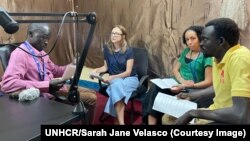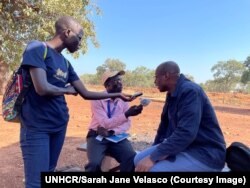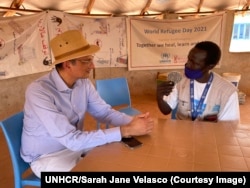Jabrallah Tia was a teacher in Sudan in 2011 when a brutal war forced him to flee to a refugee camp in newly established South Sudan. Thirteen years later, Tia is still in a camp but with a new career: journalist.
The Ajuong Thok camp in the Ruweng Administrative Area is home to almost 40,000 refugees and displaced people, most from Sudan. Another influx is expected soon, after a fresh conflict broke out in April.
“It’s terrible now when Sudan has started another war. … We’re expecting more people to come from Sudan, as they’re fleeing the war there,” Tia told VOA in a video interview over Zoom.
He knows what that’s like. Tia had to leave everything behind when he fled his home in South Kordofan state. But he said he has found new meaning in his journalism work.
The change came in 2016, when the international media nonprofit Internews offered reporting training for refugees.
Now he works for Jamjang FM, a radio station based inside a camp and run by the nonprofit Community Engagement Network. With four reporters and a station manager, Jamjang broadcasts to two huge camps in the region and local host communities.
Most broadcasts are in Arabic, the language of the Sudanese refugees, but a weekly show is hosted in the local South Sudanese language, Dinka.
“Normally we are focusing on humanitarian works and the service that’s being provided to the refugees,” he said. “We broadcast awareness, like protection from [gender-based violence]. … We talk on issues regarding health.”
Fighting falsehoods
In the sprawling camps, rumors and fake news can spread fast. Tia said he is proud at how his work helps raise awareness and fights disinformation.
During the coronavirus pandemic, he said, “we have actually played a big role.”
“And when the vaccine has arrived also, this is where we actually took much effort in order to sensitize the community,” he said, explaining that many people initially wrongly believed the vaccine to be unsafe.
“Rumors sometimes can be spread [around] the camp, and it can disturb people,” Tia said. “So, the station plays a fact-checking role. We will verify whether it’s true or not.”
In the camps, Tia said, residents often have little formal education. So, one method that works well is fictional radio dramas where scenarios are enacted to send a message, and health is always an important topic for the reporters.
Jamjang FM broadcasts a program on HIV and sexually transmitted diseases and a segment called “With a Refugee,” in which journalists speak about refugee issues.
Other shows focus on gender-based violence and women’s issues, or broadcast programs on child protection that seek to encourage parents to send their children to school instead of to work in the market.
Tia and the other reporters also go around the camp speaking to residents to collect their views and ideas, which they sometimes broadcast.
Making radio waves
Radio as a way of getting news dominates in the camp, Tia said, as there is little access to TV or newspapers.
“Most of [the camp residents], they don’t have radios, but they can listen to the FM through the phone. They have small phones,” he said.
These aren’t smartphones, however, so access to news on social media like Facebook, while common elsewhere in Africa, isn’t prevalent.
Charlotte Hallqvist, UNHCR’s external relations officer in South Sudan, said the work done by Tia and other journalists is invaluable.
“Community-based radio stations and local journalists in refugee camps with limited connectivity are a vital lifeline to accurate information for refugee communities,” she said via email.
These journalists “build a sense of community, raise awareness, spread news and information, and foster collaboration between refugees and host communities, while giving the communities themselves a voice,” Hallqvist said.
As someone with an interest in news, where does Tia get his own? Al Jazeera, Sky News Arabia and sometimes CNN, he said, adding that he’s been following the war in Ukraine with interest.
His three children — under age 8 — all listen to his broadcasts, Tia said with pride. His son wants to work in journalism like his father, while his daughter has set her sights on becoming a doctor, he said.
Tia’s own favorite stories to write center on education, a throwback to his pre-refugee days as an English teacher in South Kordofan. He also appreciates that journalism can be an educational tool in itself.
“Journalism, it is the work that provides information to the people, and information is the key,” he said. “Misunderstandings can be cleared through giving the right information out.”
That’s why Tia says he enjoys his work: “It’s a good job, although it’s hard.”


